Protecting consumers during the coronavirus (COVID-19) pandemic: update on the work of the CMA’s Taskforce
Published 21 May 2020
1. Background
The Competition and Markets Authority (CMA) works to ensure that consumers get a good deal when buying goods and services, and that businesses operate within the law.
The CMA established its COVID-19 Taskforce to identify, monitor and respond to competition and consumer problems arising from coronavirus (COVID-19) and the measures taken to contain it.
This report sets out some of the work of the Taskforce, focusing on the complaints we have received and the actions we have taken in response. It follows an earlier report on the work of the CMA’s Taskforce, published on 24 April. We intend to publish further reports while the problems persist, updating the complaints data, and providing additional information about the work of the Taskforce.
People and businesses who have seen or experienced businesses behaving unfairly during the coronavirus outbreak can report it to the CMA by using our dedicated online form. Where there is evidence that businesses have breached competition or consumer protection law, the CMA will take enforcement action if warranted.
2. Overview
The vast majority of businesses are behaving responsibly and fairly in the unprecedented circumstances created by the coronavirus outbreak[footnote 1]. But we are concerned that a small minority may be exploiting the situation, for example by ignoring customers’ cancellation rights, charging excessive prices, or making misleading claims about goods or services.
The CMA’s assessment of the current situation is based on:
-
monitoring and analysis of complaints received, both through email and its online form. From 10 March to 17 May 2020, the CMA has been contacted more than 60,000 times about coronavirus-related issues. The rate at which consumers are contacting the CMA in the week to 17 May (1,200 per day) is almost twice as high as in the last week of the previous report (week ending 19 April).
-
information received from consumer bodies, such as Which? and Citizens Advice, and through enforcement partners such as Trading Standards and sector regulators.
Based on this information and data, the CMA’s principal concerns remain as they were at the time the last report was issued on 24 April. These concerns relate to:
Unfair practices in relation to cancellations and refunds
-
The restrictions on travel and business activity resulting from the coronavirus outbreak have resulted in the cancellation of holidays, travel, event bookings and other services. In most cases, the CMA would expect consumers to be offered a full refund where no service is provided, including where a consumer cancels, or is prevented from receiving any services, because of the restrictions that apply during the current lockdown.
-
Since mid-April, the large majority of complaints received by the CMA have been about unfair practices in relation to cancellations and refunds. In the week to 17 May, cancellation complaints were being received at a rate of 850 per day on average. Consumers have raised concerns about firms refusing to provide refunds; introducing unnecessary complexity into the process of obtaining refunds; charging high administration or cancellation fees; and pressuring consumers into accepting vouchers instead of cash refunds.
-
Around three-quarters of cancellation complaints received to date relate to holidays and air travel. With summer holiday season approaching, the potential harm to consumers from companies failing to respect consumers’ cancellation rights is set to grow.
-
The Taskforce is currently investigating whether companies are failing to comply with the law. Three sectors were initially prioritised: holiday accommodation; weddings and private events; and nursery and childcare providers. Cases have now been opened in respect of certain companies in these sectors and further updates will be provided in due course. Based on the number and nature of complaints being received, package holidays has now been included in the scope of the investigation.[footnote 2]
-
Complaints about airlines – representing around a fifth of all cancellation complaints – have been passed to the Civil Aviation Authority, which has lead responsibility for the enforcement of consumer law as it applies to air travel.
Unjustifiable price increases, particularly for essential goods
-
The volume of price-related contacts received by the CMA declined from early April and remains at relatively low levels: around 40 per day in May. But the coronavirus outbreak, and the necessary restrictions on businesses and people, continue to present significant risks that prices are raised above justifiable levels in a number of sectors.
-
The CMA is investigating complaints of unjustifiable price rises, and taking steps to stop them, including by writing to 264 traders that have collectively been the subject of over 3,100 complaints – around a third of the total number of actionable complaints received about price rises[footnote 3]. It is also collecting further evidence, including about price rises further up the supply chain.
-
Where there is evidence that competition or consumer protection law has been broken, the CMA will not hesitate to take enforcement action if warranted. The Taskforce continues actively to consider potential enforcement cases against companies suspected of raising prices for essential items to unjustifiable levels.
Section 3, below, gives an analysis of the complaints received through the CMA’s online form. Section 4 describes the actions taken in response to the two principal areas of concern set out above. Section 5 summarises other work being undertaken by the Taskforce to help businesses and government protect consumers.
3. Complaints analysis
The CMA has been contacted over 60,000 times about coronavirus-related issues via emails and the CMA’s online form from 10 March to 17 May 2020. The best way to report unfair business behaviour is by filling out the dedicated online form. This section provides an analysis of the more than 54,000 submissions received via the form up to and including 17 May 2020.[footnote 4]
Number of submissions
The chart below shows the number of submissions made to the CMA’s online form since its launch on 20 March. Fluctuations should be interpreted cautiously because they can be driven by the CMA’s public statements, news coverage and organised campaigns.
The average over the period is 900 submissions a day, rising from around 400 a day in the first three weeks to 9 April to 1,500 a day in the last three weeks to 17 May. The peak of 6,700 submissions on 30 April and 5,100 on 1 May corresponds to the announcement of our programme of work to investigate businesses failing to respect cancellation rights.
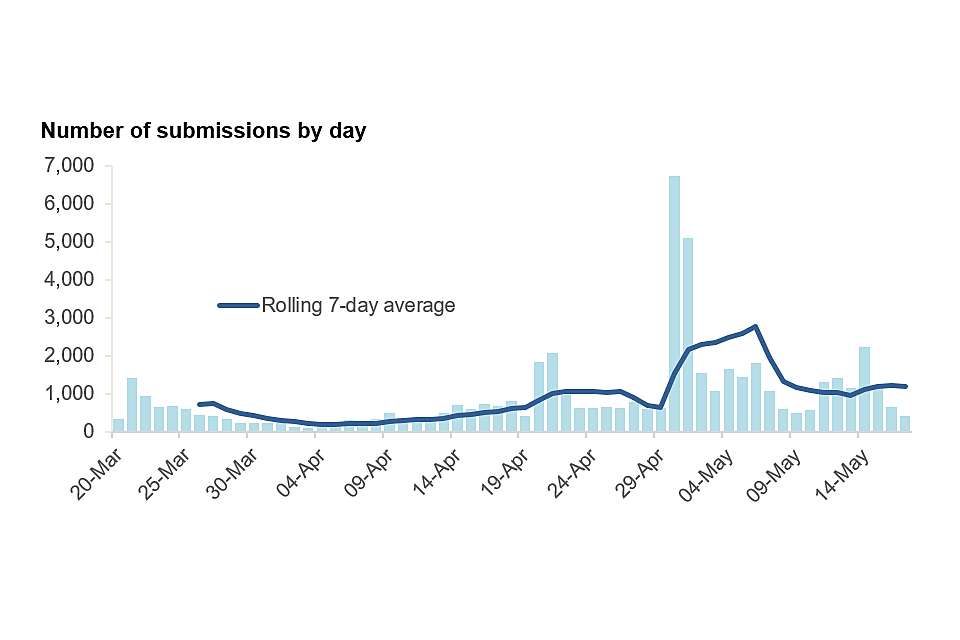
a chart showing how the daily number of submissions received through the CMA’s online form have on the whole been higher during May than in April, with the exception of a sharp peak on 30 April.
Number of businesses reported
The chart below shows the number of new businesses reported to us by day. The shape of the line is broadly similar to the submissions line, but at much lower levels. The numbers peak at just under 2,000 new businesses on 30 April, compared to 6,700 submissions on that day. The average across the period is under 300 new businesses a day.
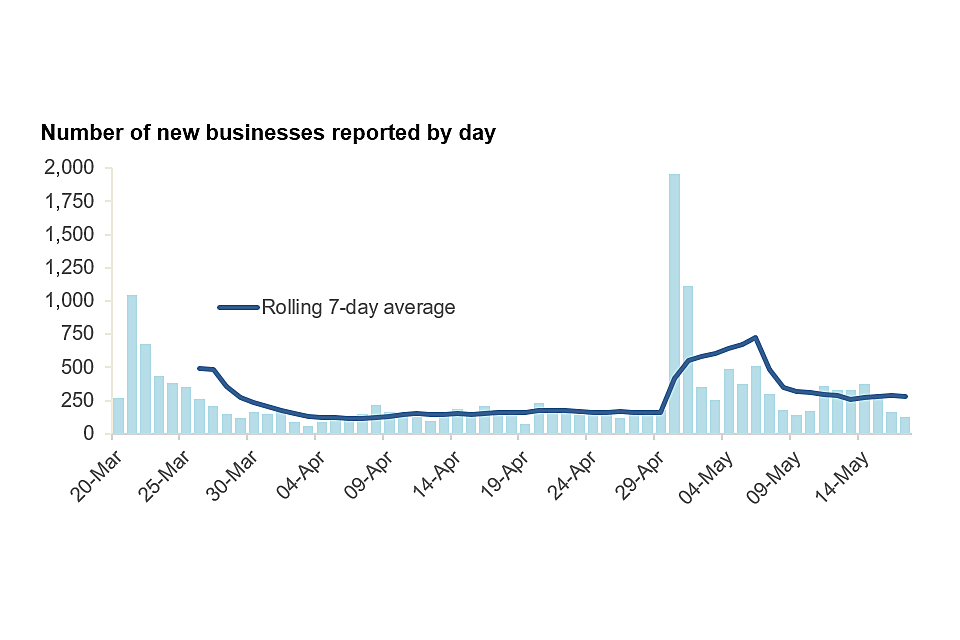
a chart showing how the number of new businesses complained about has averaged around 300 per day, with a sharp peak on 30 April and 1 May.
Note: this chart relies on matching business names reported by different complainants; it should be regarded as a good approximation, rather than an exact reflection, of the number of individual businesses complained about.
In total, there are a little over 16,000 businesses in this chart. This is a very small minority of the more than 5.9 million private sector businesses in the UK – fewer than three in a thousand.[footnote 5]
The difference between the number of submissions and the number of businesses is due to a small group of large companies attracting hundreds or thousands of complaints. Taken together, the ten most complained about companies account for 37% of submissions. By contrast, 86% of businesses have only been reported to us once.
Almost all the complaints about the ‘top-ten’ companies relate to issues around cancellations and refunds. Nine out of the ten companies supply services, all of which are to do with travel, holidays and accommodation. Only one of the top ten sells goods.
Types of complaint
A large proportion of complaints initially received by the Taskforce related to price rises, particularly for personal hygiene goods such as hand sanitiser and basic food products such as meat. Over time, however, there has been substantial growth in the number of complaints about cancellations and refunds, and a decline in complaints about prices. Cancellation complaints decisively overtook price complaints on 9 April, and have accounted for around three in four complaints in May.
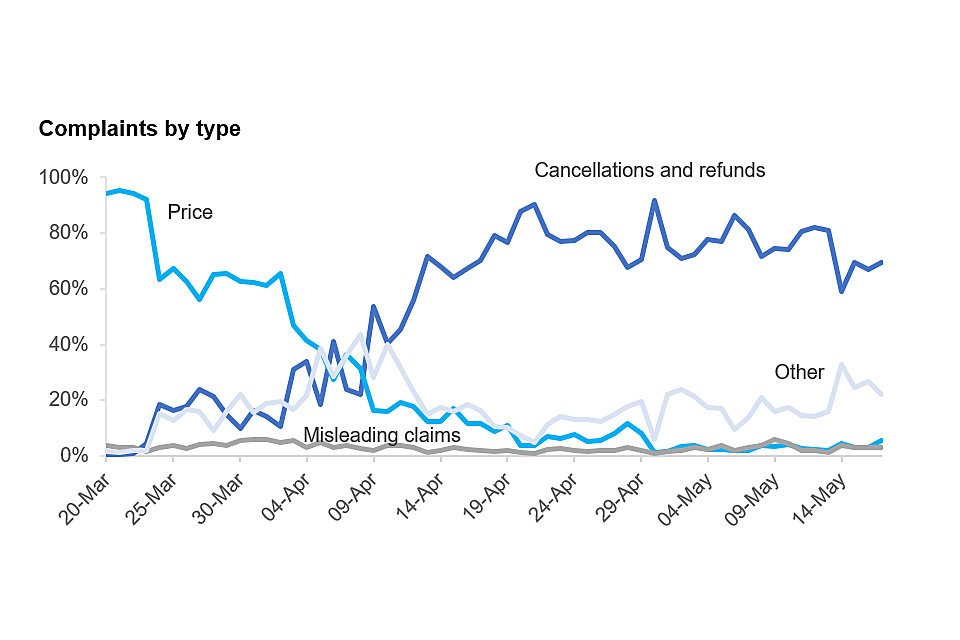
a chart showing how a large proportion of complaints received by the Taskforce were initially about high prices; but that since the beginning of April, complaints about cancellations have been rising, and they remain the most common reason for complaint.
Note: These complaint types are as selected by complainants, and include some misclassification.
Complaints about misleading claims – for instance about the efficacy of personal protective equipment – have remained low, hovering between 1% and 6% of the total. The “other” category includes complaints not within the remit of the CMA.[footnote 6] Where appropriate, these complaints are being referred to other authorities for consideration (see next section).
The chart below shows the most complained-about product categories and sectors within price and cancellation complaints. The food and drink category has received the most price complaints – more than 7,000 since 20 March – but holiday-related complaints about cancellations and refunds have attracted almost three times as many complaints – nearly 20,000.
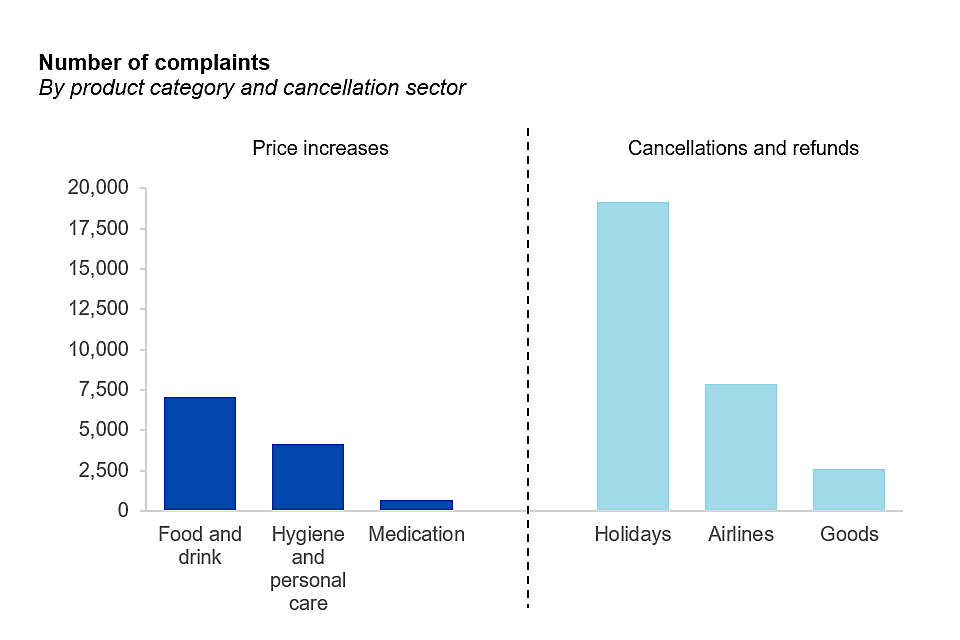
Chart shows the number of complaints by product category and cancellation sector. Food and drink has received the most price complaints – over 7,000 since 20 March – but holiday-related complaints have attracted nearly 20,000.
Note: Holidays covers packages, accommodation (lets and hotels), travel agents and booking sites
Online vs offline
The proportion of complaints relating to online goods and services has risen steadily from March to a peak of almost 90% on 21 April. Since then, it fell back to around 65% in May. This trajectory largely mirrors the trend in cancellation complaints: nearly 80% of cancellation complaints relate to goods and services bought online, while the opposite is true of price and “other” complaints.
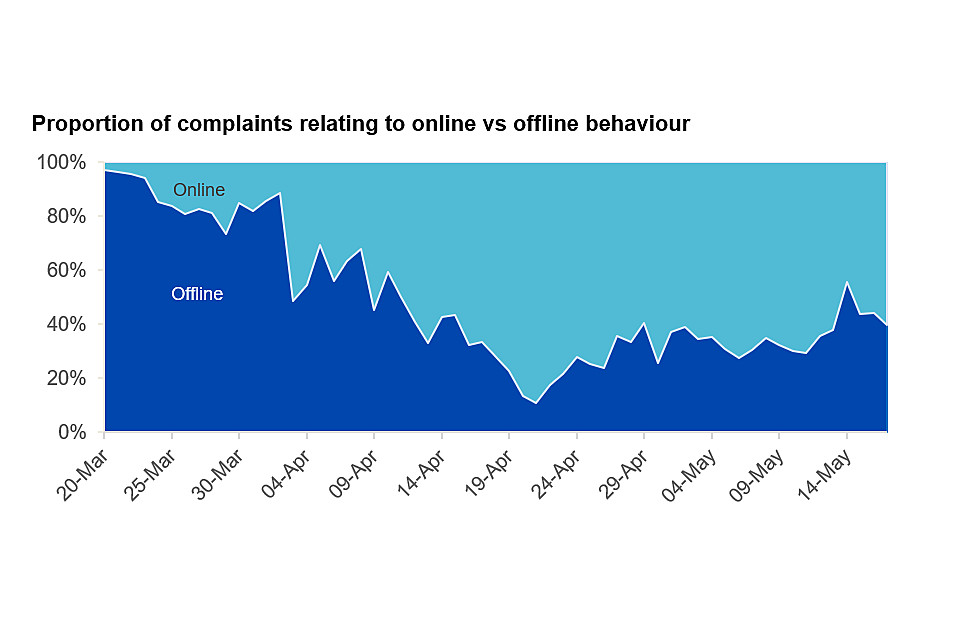
chart shows how the amount of complaints for offline behaviour has fallen since the beginning of April, and the amount about online behaviour has risen. Since then, complaints about online behaviour have remained more common than about offline behaviour.
Cancellations and refunds
The chart below shows the number of cancellation and refund complaints received since 20 March, broken down by broad sector. Complaints related to holidays (accommodation, travel agents, booking sites and package holidays) account for just over half of all cancellation complaints. Within the holidays category, around half of complaints are about package holiday providers.
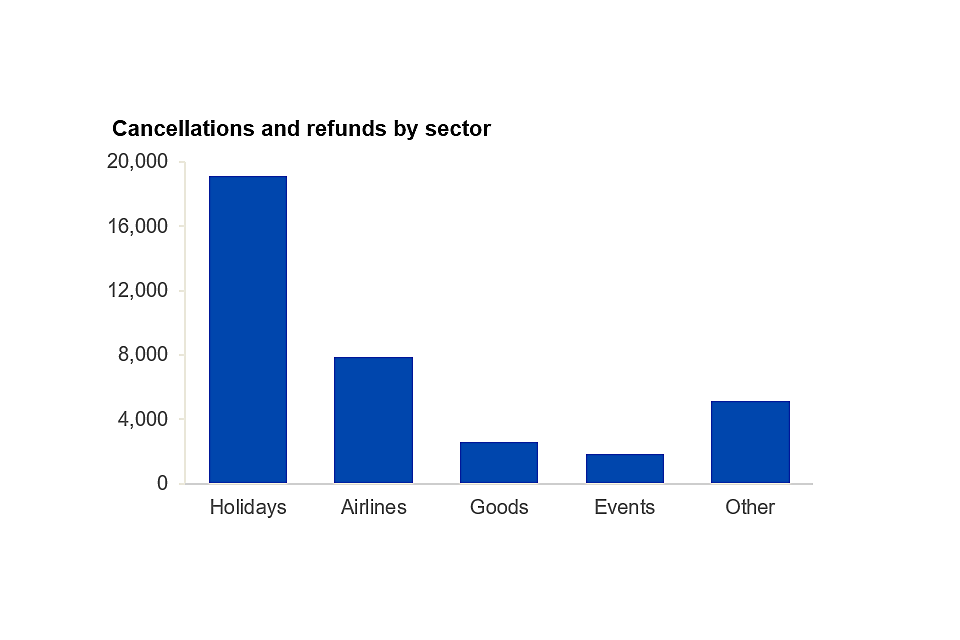
a chart showing numbers of cancellation and refund complaints by sector. Holidays and airlines are by far the most complained-about sectors, with goods and events accounting for a smaller number.
Note: Holidays covers packages, accommodation (lets and hotels), travel agents and booking sites
The chart below shows trends in cancellation complaints by sector. The sharp increase in the proportion of complaints about airlines may reflect campaigns by consumer organisations and other groups about the approach to refunds by a number of major airlines.
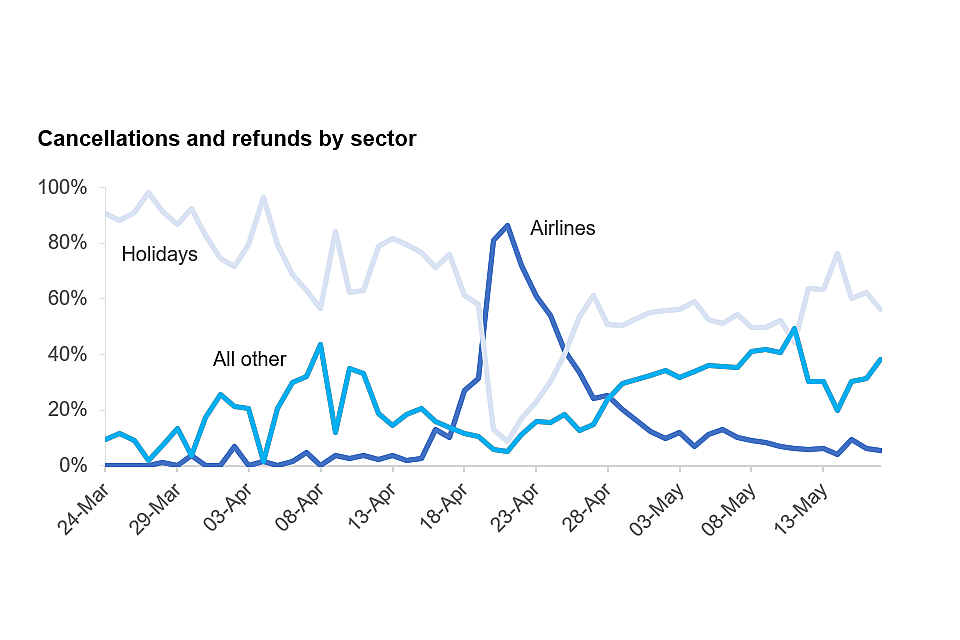
chart shows how holidays have remained the most complained-about sector for cancellation complaints since 24 March, with the exception of a brief period in mid-late April, during which complaints about airlines accounted for the majority of complaints.
Note: This chart starts on 24 March because there were very few cancellation complaints before then.
Price increases
The chart below shows a breakdown of price increase complaints by product category. The profile of price increase complaints has remained relatively stable over time, with food and drink fluctuating above hygiene and personal care. Medication has hovered around 4-8%. Overall, the most complained about product is meat (e.g. chicken, lamb, beef), followed by hand sanitiser, toilet paper and rice.
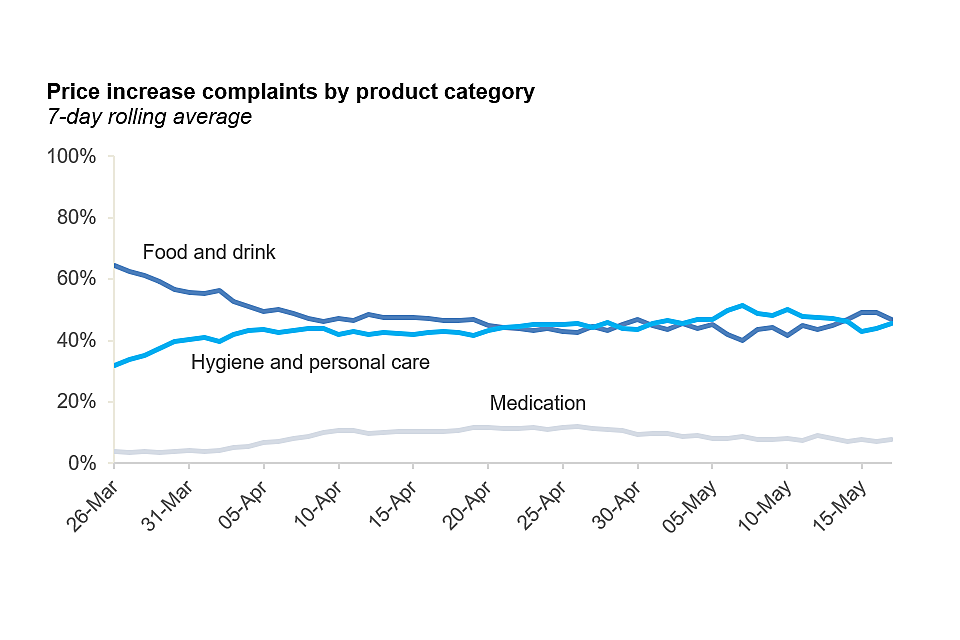
chart shows how the price increase complaints for food and drink; hygiene and personal care; and medication have remained relatively stable, with food and drink and hygiene and personal care accounting for a similar share of the total.
Size of price increases
Since 3 April, the CMA has asked those reporting unfair price increases to specify, where possible, the original price and the raised price. The chart below shows the average (median) price increase across just over 1,640 complaints that reported ‘before’ and ‘after’ prices, and the average increase for some individual products. While total numbers of complaints have decreased, the CMA is still receiving reports of notable price rises.
The largest price increases concern hand sanitiser, with a reported median rise of just under 400%. The average increase across all reports is 160%.
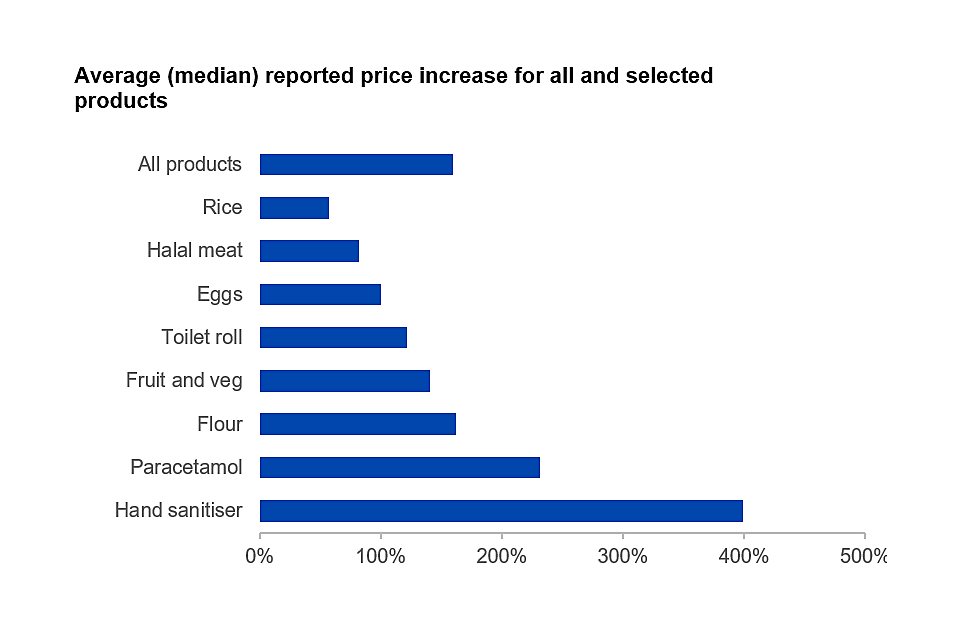
a chart showing how the average price increase reported by complainants was 160%, but that this differed across products: the lowest average shown in the chart is for rice, and the highest is for hand sanitiser.
Note: This chart is based on a small number of complaints (1,645) and shows only those products with at least 50 data points. Prices are as reported by complainants.
Location of price increases
The table below shows the number of shops complained about for every thousand retail premises, by nation. The proportion of shops reported is a small minority in all nations: nine in every thousand in England, and two in every thousand in the other nations of the UK.
Number of shops complained about for every thousand retail premises
| Nation | Number of shops complained about | Total retail premises | Complaints per thousand premises |
|---|---|---|---|
| England | 4,574 | 487,810 | 9 |
| Northern Ireland | 34 | 15,780 | 2 |
| Wales | 61 | 29,470 | 2 |
| Scotland | 110 | 53,962 | 2 |
Source: CMA complaint data; Valuation Office Agency, Stock of properties 2019; Scottish Assessors Association, General Statistics, Report 2; NI Valuation List, Administrative data at 1 April 2020.
Notes: 1. Retail premises include bank branches in England and Wales, and exclude them in Scotland. 2. Identifying the number of shops and their location relies on complainants providing the postcode of the shop they are complaining about. Because 32% of consumer price complaints do not report a postcode, the true number of shops complained about could be higher.
Densely populated urban areas have on average higher rates of complaint than more rural areas.
Intelligence from stakeholders
The Taskforce works closely with other enforcers (in particular Trading Standards Services (TSS)), consumer organisations and overseas authorities. Many of these are also collecting data about COVID-19-related consumer concerns.
Information shared by other enforcers (notably TSS) and consumer organisations (including Which? and Citizens Advice) broadly reflects the analysis set out above: in particular, cancellations and refunds have overtaken price rises as the most common cause of complaint, with holidays, travel, weddings and events among the most complained-about sectors.
Information shared by overseas consumer protection and enforcement authorities is also broadly consistent with this picture. Many have reported problems with price rises and businesses refusing to pay refunds to consumers, particularly in the travel sector, and they are using their own laws to try to tackle these issues.
4. Tackling harmful practices
The CMA has a range of options at its disposal to tackle harmful practices. It can seek further information from businesses; it can issue them with advisory or warning letters; it can work with enforcement partners, consumer bodies and trade associations; where appropriate, it can take enforcement action under its competition and consumer protection law powers; and it can advise government, including on any emergency legislative changes that might be required.
The remainder of this section sets out the CMA’s response to the two principal concerns that have come to light from complaints and other intelligence-gathering so far: problems with refunds and cancellations, and unjustifiable price rises.
Cancellations and refunds
As set out above, the large majority of the complaints received by the CMA relates to difficulties securing refunds following cancellation. The Taskforce has responded to these complaints in the following ways.
Issuing guidance to businesses and consumers
To help consumers understand their rights and to help businesses treat their customers fairly, the CMA – working closely with other consumer law enforcement partners – set out its general views on how the law operates in respect of cancellations and refunds in a statement published on 30 April. The statement covers a range of consumer contracts and different situations and sets out that in most cases the CMA would expect a full refund to be offered if:
-
a business has cancelled a contract without providing any of the promised goods or services;
-
no service is provided by a business, because this is prevented by restrictions that apply during the current lockdown; or
-
a consumer cancels, or is prevented from receiving any services, because of the restrictions that apply during the current lockdown
With many people spending more time at home and online, the Taskforce has also worked with the Advertising Standards Authority to provide guidance to consumers on avoiding unwanted and unexpected charges when signing up to ‘free’ trials.
Launching investigations
The CMA initially prioritised three sectors for investigation. These are:
-
Weddings and private events. Practices of concern include venues refusing to refund any money and telling people to claim on their insurance.
-
Holiday accommodation. Practices of concern include pressuring consumers into accepting vouchers instead of refunds.
-
Nurseries and childcare provision. Practices of concern include asking people to pay very high sums to keep a place open for their child while the nursery is closed.
Cases have now been opened in respect of certain companies in these sectors and further updates will be provided in due course.
Based on the number and nature of complaints being received, package holidays has now been included in the scope of the investigation.[footnote 7] Practices of concern include refusing refunds; making it very difficult for consumers to obtain refunds; and insisting that consumers rebook or accept vouchers.
The investigations will examine whether companies in these sectors are failing to comply with the law. Where there is evidence that this is the case, the CMA will take appropriate enforcement action, which could include taking a firm to court if it does not address the CMA’s concerns.[footnote 8]
Together these sectors account for over a third of the cancellation and refund-related complaints received by the CMA. The Taskforce may move on to examine other sectors, based on the information it receives from complaints and other sources.
Working with other enforcers of consumer law
Around 8,000 complaints – a fifth of all cancellation complaints – relate to air travel booked directly with airlines, and particularly difficulties securing refunds following cancelled flights. These complaints have been passed to the Civil Aviation Authority, which has lead responsibility for the enforcement of consumer law as it applies to air travel. A small number of complaints have been passed to Ofcom (30 complaints in respect of two telecoms companies) and the FCA (29 complaints in respect of two financial firms).
Unjustifiable price rises
The Taskforce has responded to complaints about unjustifiable price rises in the following ways.
Requesting information from individual businesses where we have concerns
As of 17 May, we have written to 264 individual businesses asking for more information, or expressing concern about unjustifiable price rises. Together, these businesses account for over 3,100 complaints: around a third of the total number of actionable complaints received about price rises.[footnote 9] Businesses would be well advised to heed these warnings, given the possibility of enforcement action, and the reputational consequences of being seen by their customers to exploit the outbreak.
To date, we have received 150 responses from the businesses to which we have written. The majority of these attribute high prices to higher costs charged by suppliers, although this does not adequately explain prices that are far in excess of the average. The Taskforce is seeking further evidence of claims about supplier pricing practices. Businesses experiencing large price rises or other unfair practices from their suppliers are encouraged to report this through the CMA’s online form.
Enforcement
As explained in the previous report on the work of the Taskforce, where there is evidence that competition or consumer protection law may have been broken, the CMA will take enforcement action, where appropriate. The Taskforce continues actively to consider potential enforcement cases against companies suspected of raising prices for essential items to unjustifiable levels.
The CMA will use its powers to their fullest extent; but it has also advised government on legislative changes that would enable a faster and more robust response to unjustifiable price rises.
Engagement with online retail platforms
Many complaints about unjustifiable price rises relate to listings placed on online platforms. We wrote to Amazon and eBay in March and have continued to draw to their attention complaints about listings charging unjustifiable prices for essential goods. The CMA expects retail platforms to take steps to prevent such listings appearing in the first place; for them to be identified and removed quickly when they do appear; and for the accounts of unscrupulous sellers to be blocked or terminated.
Setting out our expectations to industry and trade bodies
We have written to 26 trade associations and published an open letter to the pharmaceutical and food and drink industries. These summarised our concerns about the practices of a minority of traders, set out the CMA’s expectations of how traders should behave, and sought further information. The Federation of Small Businesses (FSB) and the British Retail Consortium (BRC) are working to ensure their members are aware of latest CMA guidance. The Association of Convenience Stores (ACS) has urged retailers to report those who are attempting to raise prices unfairly to the CMA during the coronavirus pandemic.
5. Helping government and businesses protect consumers
Guidance for businesses
The CMA recognises that in some cases it will be appropriate for businesses to work together during the coronavirus outbreak, to ensure that essential products and services get to the people who need them.
Competition law prohibits certain types of cooperation and information-sharing between businesses. The CMA does not want its approach to enforcing these prohibitions to stand in the way of necessary cooperation to deal with the current crisis; but nor will it tolerate crisis conditions being used opportunistically as a cover for non-essential collusion. With that in mind, we announced on 19 March 2020 that ‘the CMA has no intention of taking competition law enforcement action against cooperation between businesses or rationing of products to the extent that this is necessary to protect consumers’. Following the announcement, we published guidance on 25 March 2020 on the CMA’s approach to acceptable business cooperation in response to coronavirus.[footnote 10]
On 22 April, the CMA published guidance on its assessment of mergers during the outbreak. The guidance provides further information on key aspects of its practice, including information-gathering, the timing of investigations, the conduct of meetings and hearings, and its approach to interim measures and substantive assessment. The guidance also contained a summary of the existing principles that govern how the CMA assesses mergers when ‘failing firm’ claims are raised.
On 30 April, the CMA published a statement setting out the CMA’s view on how the law operates in respect of cancellations and refunds. (see Section 4, above).
Advice to government
A function of the Taskforce is to provide advice and assistance to Government, where appropriate, on the measures and policies it is developing in response to the coronavirus outbreak. In particular, the Taskforce has advised the Government on ‘exclusion orders’ (which exempt certain types of agreement in specific sectors from competition law) to help ensure risks to competition and consumers are minimised. At the time of writing, four exclusion orders have been enacted:
-
Groceries: The Competition Act 1998: (Groceries) (Coronavirus) (Public Policy Exclusion) Order 2020
-
Ferry transport: The Competition Act 1998 (Solent Maritime Crossings) (Coronavirus) (Public Policy Exclusion) Order 2020
All our coronavirus-related announcements and publications can be found in this collection: CMA coronavirus (COVID-19) response.
-
The CMA has received complaints via its online form relating to a little over 16,000 individual businesses, fewer than three in a thousand of the total number of private sector businesses operating in the UK. ↩
-
Details of the CMA’s work in relation to weddings and private events; nurseries and childcare providers; and holiday accommodation can be found here. Further information about the CMA’s work in respect of package holidays will be made available in due course. ↩
-
Actionable complaints are those where the complainant has specified at least one of either the postal address, postcode or web address of the business being complained about. ↩
-
We define a ‘contact’ as a person getting in touch with us, whether via email or the online form. Each form submitted online is a ‘submission’. A contact, whether by email or form, can contain zero, one or more than one product complaint (for example, a person may be complaining about several products, or none). ↩
-
BEIS, Business Population Estimates, 2019, Table 1. ↩
-
The key themes include: facing dismissal; unsafe work conditions (particularly adherence to social distancing rules); non-key workers still at work; non-essential businesses still open; companies not allowing staff to work from home; staff not having PPE (especially in shops/delivery drivers); pubs still having to pay licences despite being closed; and general concerns for public health. However, the “other” category also includes a number of cancellation and refund complaints that complainants have misclassified. ↩
-
Details of the CMA’s work in relation to weddings and private events; nurseries and childcare providers; and holiday accommodation. Further information about the CMA’s work in respect of package holidays will be made available in due course. ↩
-
Read further information about the CMA’s work in respect of the first three sectors listed. Details on work in respect of package holidays will be published in due course. ↩
-
Actionable complaints are those where the complainant has specified at least one of either the postal address, postcode or web address of the business being complained about. ↩
-
This guidance made clear that “The CMA understands that this may involve coordination between competing businesses. It wants to provide reassurance that, provided that any such coordination is undertaken solely to address concerns arising from the current crisis and does not go further or last longer than what is necessary, the CMA will not take action against it”. ↩

